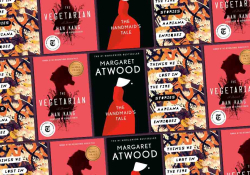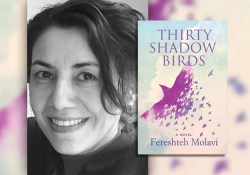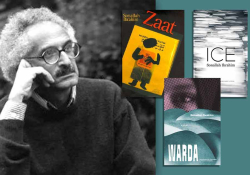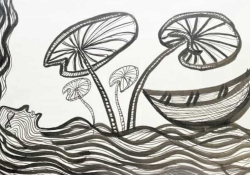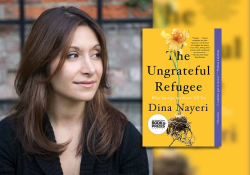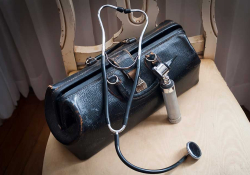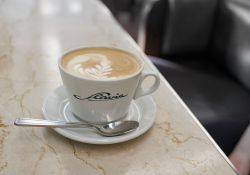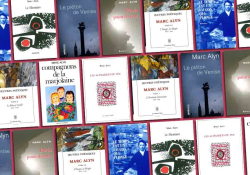How to Make a Ukrainian Easter Egg
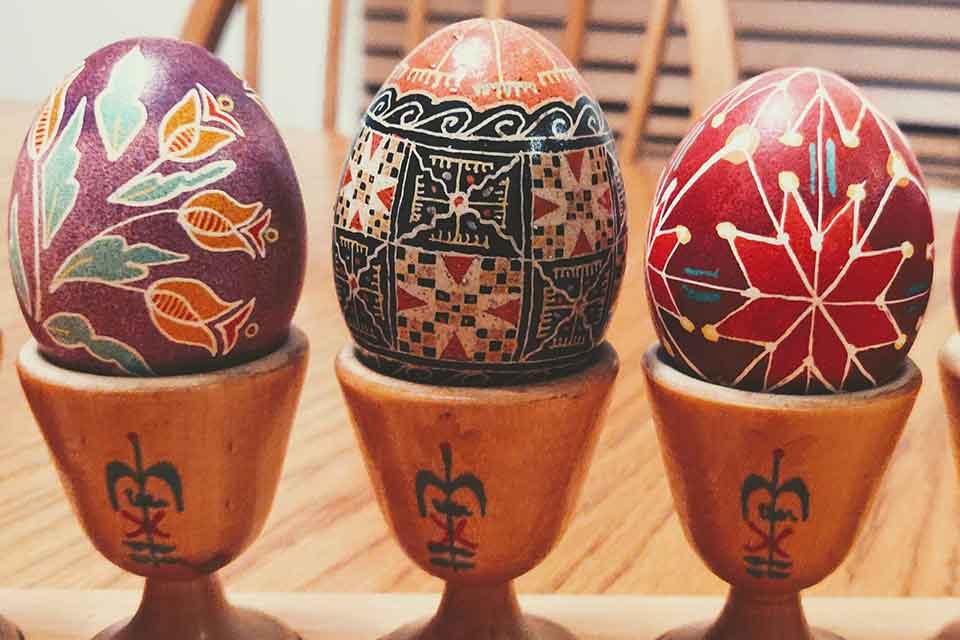
A writer uses a step-by-step guide as a mode of recounting her past pains as an American Orthodox priest’s wife, then comes full circle to the present as she grapples with her powerlessness yet again, only this time in witnessing the current invasion of Ukraine.
Step 1. Marry a Polish American man. Be amazed as you step through his family’s crammed home, with its pink walls and its soup tureens stuffed into curios, its cut crystal and wide, scalloped platters. Its Babcia and Dziadek who live downstairs. This home is the only home that your new husband and his mother have known. Your homes have been bleak apartments containing a mother and a brother, a couch, a TV. The only item not Polish in this house is your new father-in-law, who is Swedish American, hardworking and tall, and as thin as his wife is round. Your family history is spotted and brittle, like one little square of someone else’s yellowed linen at a yard sale on an unnamed dusty road. And here: this house, this home, this history. Open the front door (never used) and discover an upright piano shoved in a nook atop which rests the biggest crystal bowl of painted wooden eggs probably in the world. On a little street in an old steel city, only a drive away from your guarded living. All these years. Who knew.
Step 2. Move to New York City. Drive east and south with your new husband to be a writer (you) and a musician (him). Shortly after arriving, convert to Russian Orthodoxy at the behest of your husband, who discovers it on 2nd & 2nd in the East Village and presents it to you, and you say, sure because the priest and people are cool and funny and smart and warm, and it seems the next obvious step as you widen your Slavic family. Believe it is part of a plan. Set your writing aside. Scrap your dreams and goals. Pray day and night. Turn into someone you don’t recognize. Stare at the sidewalk as you walk to the train. Lord Jesus Christ, Son of God, Have Mercy on Me, a Sinner.
Step 3. Go to seminary. Not as a student but as a wife of a student with two children whose father grows a long, unshaped beard and wears a black cassock. You don Slavic cultures that are not yours, yet here you are, head covered and surrounded by icons written by real Russians with names like Dmitri Andreyev while your children are named after saints whose people wouldn’t claim them as theirs, not really, yet your daughter is the tsarina, your sons, ascetic Russian monks. Transformations abound. Every minute, in service to others. But here, deep down, in a squeezed-up hidden place, your creative you screams in a muffle. So you unbind her and free her late at night, though you think it is a useless act, to type fictions in your quiet hours, which help no one, so you pivot and write letters to people on death row whom you find online. One day, you open a book that you brought with you to seminary, brought from the stuffed, little, loved house with the pink walls. Eggs Beautiful: How to Make Ukrainian Easter Eggs.
But here, deep-down, in a squeezed-up hidden place, your creative you screams in a muffle.
Step 4. Put the kids to bed. Breathe. The candle to light. The beeswax to scoop. The kitski to write the wax, and the eggs. The dyes, light to dark, yellow to black. Your own silence that you choose. Your own hour. And then a knock. It is your sweet friend from across the hall, another wife of another student, a friend at seminary and then gone. The dearest of friends for the shortest of times. The kindest of eyes. What is this? she says. It is this, you say. Pysanky. She beholds the table. This crafter of women. This Montessori teacher. This resourceful queen who is now upswept, afloat on the quiet air. May I? she says. Oh, please. Please, do. You make beautiful eggs with your friend. You give most of them away.
Step 5. Go to your first parish as the priest’s wife. Bear your third child. Feel the swell of great loneliness. Live your life for God. Disappear. Pack your psyanky. Go to your second parish because your priest-husband is depressed at the realization that the first parish is just a regular New Jersey parish with territorial old people and not like the atypical, grand cathedral on 2nd & 2nd in Manhattan, the driving force of your conversion, and, if we are to be completely honest, the only and singular reason why you made any of these decisions at all—but what did you know? You were young and impressionable. In your new parish home, try your darndest to be the best mother and wife and god-loving person you can be. Do this for years. But also, in your free time, when no one is looking, obtain an advanced degree (feeling rebellious).
Step 6. Lift your chin to the wafting of betrayal. Clamber for solid ground before the ground begins to shift. Months preceding the quake of quakes, empower yourself by quitting your teaching position that is taking too much of your time, and let’s face it, you need to keep an eye on things because he is spending all his hours with this new, slippery user who claims she wants to be a nun yet can’t get enough of him, and this is highly distracting. No worries! You will not whither, dammit (not yet), and you will claim territory and host a pysanky experience for the women at church, the church that will forsake you, for the women whom you love but will have to leave. You were never the adored Father, but you were, for a time, their little mother, their Matushka. But here, on this one evening, a pysanky class. This tool is called a kistka. This kistka is for finer lines; this one is for filling. Scoop the wax. Now wave it over the flame to warm it. Not too long, or it will drip. You will get better as you go. No worries. We have all the eggs in the world.
Step 7. Sit amongst the rubble. The reasons you lived your life have been removed from your life; i.e., the truths you believed are now false; i.e., your little life, half over, on this planet—one life of billions but yours nonetheless—was wasted. You are a woman who values time, and your time was misspent. Two of your three children are broken from the quake of quakes, and despite the fact that you were the main victim in this calamity, they blame you for their pain. Always a doer, and yet you sit, aware of your daughter’s agony but unable to offer up. She sees the white eggs, blown and ready in a carton, the tools and the wax, leftover from your last attempt to create something beautiful, despite the crack running through your brain, through your heart. Daughter opens the jars of dye. Lights a candle. Do you want to make pysanky? she says. The correct answer is clear but you cannot give it. No, you mumble, and shift your position, adjust a shard poking in your back. She draws the wax, completes one and a half eggs, then blows out the candle.
Sit amongst the rubble. You are a woman who values time, and your time was misspent.
Step 8. Grow wings of steel. Beat them and watch the lies roll away like tumbleweed, the fantasy dust disperse. See clearly, finally, this world and its holders of power who wear ties or miters, and reject them all. Wear your atheism, its adherence to facts, around your throat, speaking truths, removing the baptismal cross and pressing it into the garbage to mingle with hair and grease. Wear your feminism, its rejection of male-created constructs so fully saturated in this planet, around your skull, replacing the headscarf and tossing it in the Goodwill bag along with long skirts and smocks and all brandings of submission. Run the roads for hundreds of miles, your quadriceps and self-reliance propelling you forward. Do this for ten years. Never think of eggs.
Step 9. Halt your customary evening routine and watch as Russia invades Ukraine. Sit for hours on the sofa, viewing the horrors and responses and nonresponses. Replace your 5:30a.m. NPR audio news with MSNBC audio news so as not to miss one moment of Ukraine journalism. Send money to UNICEF. Wake at 2:00a.m. and connect your bluetooth to Sky News. Dream of Ukraine, of their decimated streets, of their elderly, crossing rickety planks over rivers, leaving everything they have known. Pity the clueless boy-men Russian soldiers, being sent off with bad food and bad ideas, the same age as your sons. Feel emotionally closer to Cal Perry and Ali Velshi than certain family members. Yell at your flat-screen TV, at your president, whom you respect and admire but from whom you want more; you want him to get those old Polish MiGs in the hands of the bravest people on Earth who are living and dying for democracy. You know they would have your back, and you see disappointment surface in their eyes as the days go by as they request the same two things over and over while their people perish as we ponder Putin’s reactions should we dare do the right thing. You are embarrassed to be American, yet again. You wring your hands in your modest but unbombed home while toddlers in puffy coats and old women in headcoverings die with fear written across their brows.
But you are here, holding these small acts of commitment and care, and they were real, and they meant something to you at the time.
Step 10. Open your curio. From the back of this antique piece (handed down from the woman of the pink walls who is now ashes in a pink urn in the ground, three thousand miles away), withdraw a row of six pysanky, each in its own wooden cup on a narrow wooden tray. Hold the eggs in your hand. Try to recall when you made each one but falter. Know, though, that the shiniest one with the fine detail, with the painstaking, geometric design, is one of the first ones, and that the faded one with the dull sheen from a quick rubbing of olive oil, with its easy floral pattern, is more recent, yet still a lifetime ago insofar as you are neither of those people anymore. But you are here, holding these small acts of commitment and care, and they were real, and they meant something to you at the time, so no matter what happens, no matter what cracks or what falls apart or what dies, no one can take away your right to live on this planet, in whatever form you choose, as long as you are trying to be good and to be human and to be free.
Suquamish, Washington

